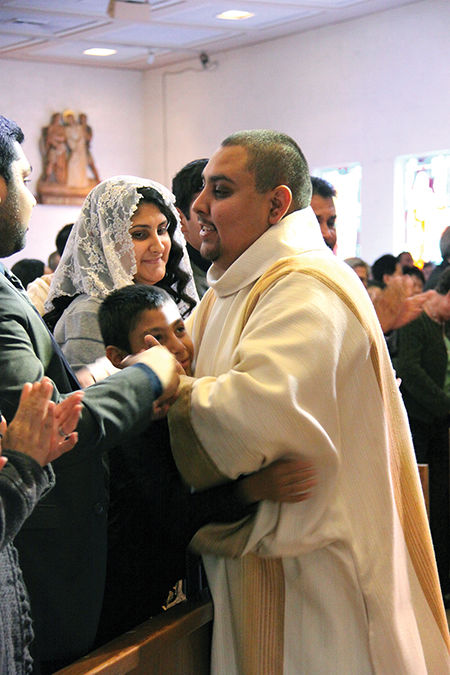Archbishop José H. Gomez is fond of repeating the words of St. Rafael Guízar Valencia, a missionary saint of Mexico: “A bishop can do without his miter, the crozier, and even without the Cathedral. But he cannot do without the Seminary, since the future of his Diocese depends on it.”
Why? Because together with the bishop, his priests are the “the servants of Christ and stewards of the mysteries of God” (1 Corinthians 4:1) and entrusted with “the ministry of reconciliation” (2 Corinthians 5:18) in the work of the New Evangelization, the preaching of the Gospel of Jesus Christ.
The Office of Vocations of the Archdiocese of Los Angeles is proud to present this occasional series of articles on the Formation of Seminarians and the Promotion of Priestly Vocations. These articles will be based primarily on the two guiding documents of the Catholic Church on the Formation of Candidates for the Priesthood:
—Pastoris Dabo Vobis (I Will Give You Shepherds) by Pope John Paul II in 1992 (hereafter referred to as PDV).
—The Program for Priestly Formation, 5th Edition from the U.S. Conference of Catholic Bishops in 2006 (hereafter referred to as PPF).
These articles will have as their focus the formation of diocesan priests, that is, those whose primary ministry will be to serve as parish priests.
In previous generations here in the U.S., and still in some countries of the world, seminary formation lasted as long as 12 years, often beginning in the high school seminary. Why so long? Precisely because the Church is forming men who will serve as priests for the work of the cura animarum, for the care and salvation of souls. If a physician, a doctor of the body, can study in medical school for six years or more, how much more must a priest, a doctor of the soul, spend in preparation for his priestly ministry?
Thus, the current formation of seminarians generally lasts from seven to nine years: seven for those who have B.A. degree but lack the required credits in undergraduate Philosophy to begin their four years of graduate-level Theology studies; or nine years for those who begin their Philosophy studies as a college freshman.
In the Archdiocese of Los Angeles, Philosophy studies take place through the Juan Diego House of Formation in Gardena, while Pre-Theology and Theology studies take place at St. John’s Seminary in Camarillo.
Far from being a place of purely academic studies, the Seminary — both Juan Diego House (for Philosophy) and St. John’s Seminary (for Theology) — is a time and place of intense and comprehensive formation according to what PDV and the PPF call the Four Pillars (or Dimensions) of Priestly Formation: Human Formation, Intellectual Formation, Spiritual Formation, and Pastoral Formation.
Without due attention and growth in all four of these dimensions, a seminarian will not be formed into the true priest that Christ and the Catholic Church expect from them — true men of God, formed in the intellectual and doctrinal Tradition of the Church who are men of deep prayer and capable of serving with joy, fidelity, zeal and great humility the people of God in the pastoral work of the salvation of souls.
And please do not despair if your parish priest(s) are not there yet! Lest one think that this task of formation according to the Four Pillars ends with one’s priestly ordination, this is, as PDV and the PPF explain in the clearest of terms, the lifelong task and goal of every priest throughout the exercise of their sacerdotal ministry. Future articles will explain more in depth the implications of formation according to the Four Pillars.
We priests and seminarians seek with all faith and trust to be formed according the Most Sacred Heart of Jesus Christ, the Eternal High Priest of the New Covenant. May the Blessed Virgin Mary, Mother of Priests and Bright Star of the New Evangelization, St. Joseph, St. John Vianney and St. John Paul II intercede for us always.
Please pray for your priests and seminarians and continue to pray for, invite, encourage and support the work of promoting vocations to the priesthood and religious life.
This is the first in an occasional series on the formation of seminarians and the promotion of priestly and religious vocations in the Archdiocese of Los Angeles.
BY REV. STEVE DAVOREN & REV. SAM WARD
Father Steve Davoren is the director and Father Sam Ward the associate director for the archdiocesan Office of Vocations. They can be contacted at (213) 637-7248 or through www.LAVocations.org. Follow the Office on Twitter (LAVocations), Facebook (LAVocations) and YouTube Channel (LA Vocations).

